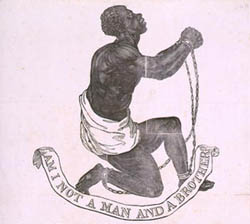Wednesday Lazy Linking
Welcome Farkers: I noticed (from the massive surge in impacts on my web server) that this post — in particular, Jourdon Anderson’s letter to his former captor, which I originally found through stuff white people do (2009-04-28) — was recently featured on the front page of Fark.com. I'm flattered; and presumably this also means that for the time being I'll be getting a lot of readers who are more or less new to the blog. By way of introduction, to who I am, where I’m coming from, and what I care about, you might check out the links at GT 2009-01-29: Welcome, Antiwarriors.
For reference, I’ve also written many other articles on the topic of slavery, and on the ways in which we talk about, or don’t talk about, the history of slavery. See particularly: GT 2005-01-03: Robert E. Lee owned slaves and defended slavery, GT 2008-04-18: Just shut the fuck up, GT 2006-03-21: The humane slave-driver, GT 2006-03-04: Republican virtue (or: the Man who would be King).
Quote for the Day: After the end of the Civil War, many former slavers tried to contact the black men and women they had once enslaved — even those who had escaped during the war and headed north — to try to convince them to return to the plantation and work the land as hands or tenant farmers. One of those freedmen, Jourdon Anderson, wrote a letter back to his former captor, explaining the terms on which would return. This may be my favorite thing that I read all week. Emphasis is added.
Dayton, Ohio, August 7, 1865
To My Old Master, Colonel P.H. Anderson
Big Spring, TennesseeSir: I got your letter and was glad to find you had not forgotten Jourdon, and that you wanted me to come back and live with you again, promising to do better for me than anybody else can. I have often felt uneasy about you. I thought the Yankees would have hung you long before this for harboring Rebs they found at your house. I suppose they never heard about your going to Col. Martin’s to kill the Union soldier that was left by his company in their stable. Although you shot at me twice before I left you, I did not want to hear of your being hurt, and am glad you are still living. It would do me good to go back to the dear old home again and see Miss Mary and Miss Martha and Allen, Esther, Green, and Lee. Give my love to them all, and tell them I hope we will meet in the better world, if not in this. I would have gone back to see you all when I was working in the Nashville hospital, but one of the neighbors told me Henry intended to shoot me if he ever got a chance.
I want to know particularly what the good chance is you propose to give me. I am doing tolerably well here; I get $25 a month, with victuals and clothing; have a comfortable home for Mandy (the folks here call her Mrs. Anderson), and the children, Milly, Jane and Grundy, go to school and are learning well; the teacher says Grundy has a head for a preacher. They go to Sunday School, and Mandy and me attend church regularly. We are kindly treated; sometimes we overhear others saying,
Them colored people were slaves down in Tennessee.
The children feel hurt when they hear such remarks, but I tell them it was no disgrace in Tennessee to belong to Col. Anderson. Many darkies would have been proud, as I used to was, to call you master. Now, if you will write and say what wages you will give me, I will be better able to decide whether it would be to my advantage to move back again.As to my freedom, which you say I can have, there is nothing to be gained on that score, as I got my free papers in 1864 from the Provost Marshal General of the Department of Nashville. Mandy says she would be afraid to go back without some proof that you are sincerely disposed to treat us justly and kindly–and we have concluded to test your sincerity by asking you to send us our wages for the time we served you. This will make us forget and forgive old scores, and rely on your justice and friendship in the future.
I served you faithfully for thirty-two years and Mandy twenty years. At $25 a month for me, and $2 a week for Mandy, our earnings would amount to $11,680. Add to this the interest for the time our wages has been kept back and deduct what you paid for our clothing and three doctor’s visits to me, and pulling a tooth for Mandy, and the balance will show what we are in justice entitled to. Please send the money by Adams Express, in care of V. Winters, esq, Dayton, Ohio. If you fail to pay us for faithful labors in the past we can have little faith in your promises in the future. We trust the good Maker has opened your eyes to the wrongs which you and your fathers have done to me and my fathers, in making us toil for you for generations without recompense. Here I draw my wages every Saturday night, but in Tennessee there was never any pay day for the Negroes any more than for the horses and cows. Surely there will be a day of reckoning for those who defraud the laborer of his hire.
In answering this letter please state if there would be any safety for my Milly and Jane, who are now grown up and both good-looking girls. You know how it was with Matilda and Catherine. I would rather stay here and starve–and die if it comes to that–than have my girls brought to shame by the violence and wickedness of their young masters. You will also please state if there has been any schools opened for the colored children in your neighborhood. The great desire of my life now is to give my children an education, and have them form virtuous habits.
Say howdy to George Carter, and thank him for taking the pistol from you when you were shooting at me.
From your old servant,
Jourdon Anderson
The letter was reprinted by Lydia Maria Child in her anthology, The Freedmen’s Book. Jourdon Anderson’s body now rests in the Woodland Cemetary, in Dayton, Ohio, so it seems that his old captor never accepted his offer. For reference, the back wages he demanded — $11,680 in 1865, before adding interest — would be worth about $162,452 in 2008 dollars.
Discovered thanks to stuff white people do (2009-04-28)
The invasion begins tomorrow: SubRosa community space (2009-05-02): First Ever Santa Cruz Anarchist Convergence! May 7-11.
The Santa Cruz Anarchist Convergence is coming to town! Yes, here, between the forest and the ocean, among the students and the yuppies, where Santa Cruz anarchists have fostered a close-knit community dedicated to destruction of this world and the creation of another. Santa Cruz is a hub of anarchist culture and resistance, with a long history of radical struggle and active anarchist projects spanning decades. Santa Cruz is proud to host the Santa Cruz Anarchist Convergence, a four-day anarchist event for building community and resistance and sharing radical ideas.
More one-way mirror transparency (+): Jesse Walker, Hit & Run (2009-04-23): In Bailouts End Responsibilities.
On crony-statism, state capitalism, and living in a bubble: Sheldon Richman, The Goal Is Freedom (2009-05-01): Of, by, and for the elite
Libertarianism or Barrbarism? Roderick Long, Austro-Athenian Empire (2009-05-04): More Crap from the
Libertarian
Party (with a hat tip to Soviet Onion in the comments back here). In which the Libertarian Party sends out a press release urging the United States government tocontrol the border,
escalate the use of police-state checkpoints against immigrants, and consider all would-be immigrants diseased until proven healthy.I’d be pissed if I weren’t beyond caring about anything the LP says or does. Individual party members are often perfectly good people, and well worth talking to, and well worth inviting to something new and better; but the party, as an organization, is worth taking notice of only as an enemy, to be shoved out of the way along with the rest of the belligerent busybody Know-Nothing creeps.
He’s wasn’t using it, anyway: Mike Gogulski (2009-05-03): Steal this number: 595-12-5274
More on decentalism and localism: A couple of comments from Darian Worden following up on the recent monster thread here: DarianWorden.com (2009-04-27): Individualist International and DarianWorden.com (2009-04-30): Stick It To Your Kind. Whether or not I agree with Darian about
multiculturalism
depends on what the word’s being used to mean (there’s a lot of different things calledmulticulturalism,
some of them descriptive theories about American history; some of them normative theories; some of them overtly relativistic; others universalistic; etc.). Otherwise, twinkles.On the production of knowledge in a peer-to-peer society: Michel Bauwens, P2P Foundation (2009-04-27): Ryan Lanham: dissolving universities?. I think that the discussion underestimates the importance of architecture and physical space in creating scholarly community; I think it also underestimates what I think would be the most noticeable effect of less businesslike, more mutualistic universities, without the distorting effects of state funding and state-imposed accreditation systems — that they would be smaller, more numerous, and less oriented towards churning out
professional degrees
in subjects that would be better taught completely outside of the university setting, if not for the political-economic distortions that shove them into institutional structures where they don’t belong. I also protest the notion that there’s something wrong withesoteric
subject-matters or that best-selling authors, just as such, somehow have a better grip on what’s relevant than scholars working intensely on a tightly-focused subject. (Surely they have a better grip on what’s relevant to people outside the University. But that’s not necessarily the kind of relevance that a University ought to be concerned with.) But I agree that Universities are set for a radical change, in an increasingly peer-to-peer world, and that the change will involve less institutional aping of business, a more mutualistic orientation, and hopefully less credentialism. It’s an important discussion and this is a good start.I’ll never finish the Internet: Dare Obasanjo, (2009-05-05): RSS readers modeled after email clients are fundamentally broken. Actually, I’m inclined to say that presently-existing e-mail clients are also fundamentally broken, although they call for a different sort of fix.
Shameless Self-Promotion opportunities: Jeremy Trombley is now running a regular
What Are You Up To? Wednesday
feature.


